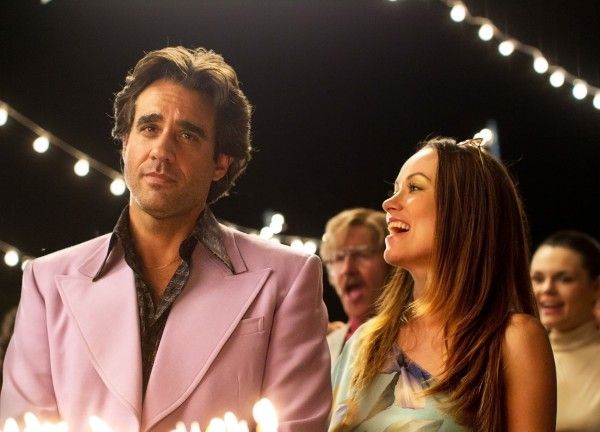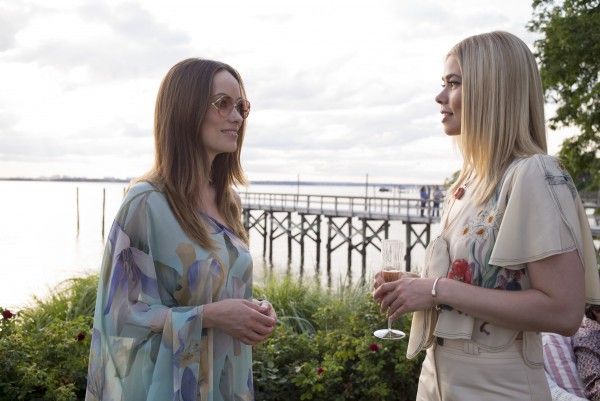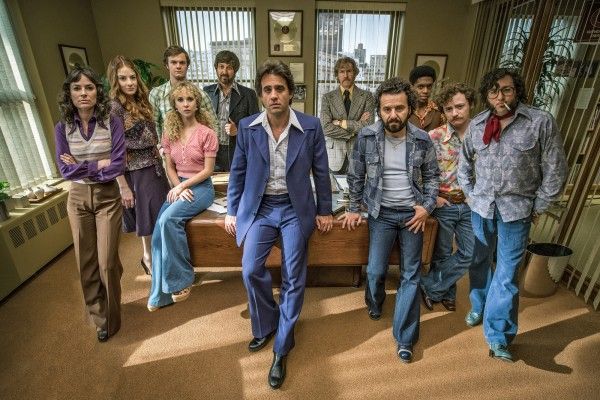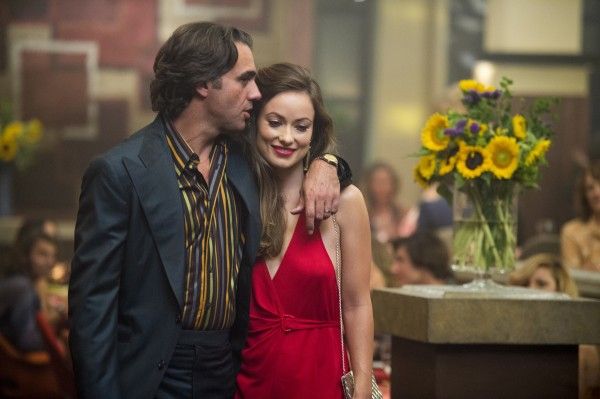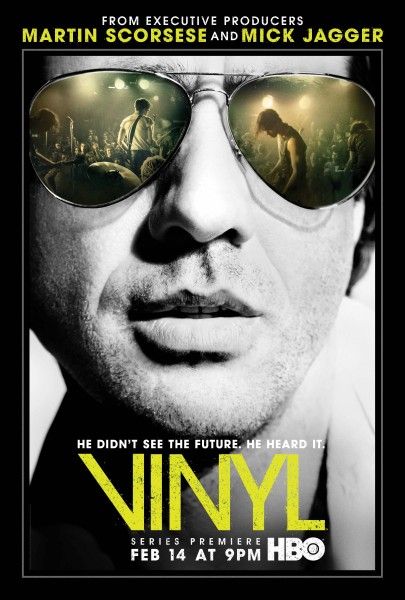From executive producers Martin Scorsese (who directed the pilot), Mick Jagger and Terence Winter, the new HBO drama series Vinyl, set in 1970s New York, is a ride through the sex-and-drug-addled music business at the dawn of punk, disco and hip-hop. And it’s all seen through the eyes of record label president Richie Finestra (Bobby Cannavale), who is trying to save his company and his soul without destroying everyone in his path. The series also stars Olivia Wilde, Ray Romano, Juno Temple, James Jagger, Ato Essandoh, Max Casella, P.J. Byrne, J.C. MacKenzie, Birgitte Hjort Sørensen, Jack Quaid and Paul Ben-Victor.
While at the TCA Press Tour, actress Olivia Wilde (who plays Richie’s wife, Devon, a former actress and model who was part of Andy Warhol’s Factory scene in 1960s NYC and is now a suburban mother of two) spoke to Collider for this exclusive interview about the influence that both Martin Scorsese and Mick Jagger have had on her, how collaborative this experience has been, bringing her own ideas to the table, the deep connection between Richie and Devon, her character’s backstory, and why you’ll enjoy this show, whether you’re a passionate music fan or not.
Collider: Could you have imagined, at any point in your career, that you’d be working on a project that was being produced by Martin Scorsese and Mick Jagger?
OLIVIA WILDE: No! It’s insane because they’re two of the most influential people in my life since I was young. That’s why all of this seems slightly dream-like. It feels so perfectly catered to my own personal dreams and fantasies and taste. Mick Jagger has been an idol of mine since I was 10 years old. Through his music, he has taught me so much about rock ‘n’ roll, but also about the blues and about the experience of live music, going to several Rolling Stones shows, growing up. I also went with my folks, which was a bonding experience.
So, he holds a significant place in my psyche, as well as being not only a music icon and someone who’s inspired me through music, but also through fashion and his persona, just being a brilliant bad-ass. I always thought he was so interesting, being an economist, as well as a rock star. He’s just a fascinating guy. Knowing he was also a producer, before this project came along, it fascinated me. Mick Jagger has produced some great films and brought us stories about the music industry that have changed the way we think about how music is made. I never thought I would actually call him my boss, let alone meet Mick Jagger or have any reason to say my name in the same sentence as his.
Scorsese, from a completely different angle, is possibly more intense, in those ways. Growing up, I watched his films and very much wanted to be a part of that world. I wanted to tell stories, as he told stories. He represented, to me, the ultimate. Being directed by him in the pilot would have been, in itself, a life-changing experience, but to continue being produced by him, as a part of the show, is mind-boggling. It’s insane!
Were you ever concerned, with all of these men involved, that they wouldn’t know how to properly tell this woman’s story?
WILDE: I never even had a chance to worry about that because, straight away in the pilot and the prep before the pilot, Marty was so collaborative in making Devon more and giving her a fair shot by showing how multi-dimensional she was. We worked together to create moments for her, just within the pilot, and then thinking about where she had been and where she would go, in the future of the show. I never even had a moment to say, “Is this going to be a macho boys’ club,” because his interest in Devon and making her “somebody” was immediate.
It’s easy to see how she could become one of those characters who could just get lost into the background, if people weren’t making an effort.
WILDE: Oh, yeah! She could just represent Richie’s life in the suburbs and what he’s given up. Easily, you could take the same basic structure of the story and have Devon be left by the wayside. It’s thanks to the entire collaborative team. [Terence Winter] was also very collaborative, from the very beginning. I’m not sure if, when they hired me, they knew how intense my focus was going to be on fleshing out Devon and how demanding I was going to be, but it all came from a place of passion and constructive ideas. I never whined to them about her not being good enough. I was so thrilled to be a part of the show. But I definitely came to the table with a bunch of ideas and, to their credit, they were immediately collaborative. In another situation, people could have just ignored me, and then she would have been left to be in her Greenwich, Connecticut kitchen, sobbing by herself with a pack of cigarettes.
Have you always been very vocal, in that way, or is that something that’s developed as your career has grown?
WILDE: I think my confidence has developed over the years, in terms of the speed at which I will reveal how collaborative I want to be. Early on, I knew I had ideas, but I wasn’t sure when it was appropriate to bring them to the table and I was so intimidated by these titans that I was working for. But it started around the time of Tron, when I was really excited by the creative process and the prep that went into that. I spoke up often, at those writing sessions. That team was very collaborative, and I helped craft who that person became. We took her quite a ways from that original plan to what we ended up with, so that bolstered my confidence. Then, going forward, producing Drinking Buddies and creating someone without a script and having to really invest all of my ideas, actively and at all times, throughout the day, just because we were creating it as we went along, bolstered my confidence further. So, the time between those two projects really was my evolution. Now, I have to say that I approach every project with that same energy. I also think that, since I started producing, I see the process from a different perspective, which affects the way I jump on board immediately.
We only get some glimpses of Devon in the first couple of hours, and we don’t know too much about her or where she comes from yet.
WILDE: Exactly! What I do think is established in the pilot, which is important for the show, is the deep connection between Richie and Devon. They are best friends and partners. We know they got sober together and we know there’s a very important reason they got sober. It hasn’t been revealed yet, but we know it’s the one line he can’t cross in their marriage. I love this couple. They’re so connected and honest with each other. You’ll see throughout the series that Devon is the one person that Richie can really be honest with, and they need each other. They also have a deeply passionate connection that is very fiery and volatile. They can’t live without each other, and they can’t live with each other. So, building their relationship in the pilot was important to us because we knew that these people were going to go on to have a very tumultuous, complex relationship and we wanted to really establish their connection, so that people would root for them.
We also get a little glimpse into who Devon was before having this family life. Will we get to learn more about that side of her?
WILDE: Yeah. What’s happening is that she’s being confronted with the fact that that world still exists, and it’s only her choice not to be a part of it. Does she still want to make that choice? Their children are no longer babies, which is why they left. They thought this is what you were supposed to do – to live in the suburbs and be responsible. Now, she’s left with wondering what her identity has become. She’s so supportive of Richie, but she’s not willing to give up the artist that she actually is. You see that very quickly, as the season starts up. She’s miserable, but she can’t let people see that because she left pretending that this was her dream, and that she was so happy to leave and move away and live this gilded lifestyle out in the suburbs with everything you could every dream of. The way she handles that is so unusual, in terms of what we’ve seen with characters in both film and television. I like that Devon reveals herself to be more cunning than you’d expect. She’s not the long-suffering wife, which I was very adamant about.
Who do you see as the audience for this show?
WILDE: Anyone who is a real passionate music fan is primed to love the show, and they should be and will be happy. Also, people who don’t even know that they are passionate about live music and the way the industry works are going to enjoy it. That’s the cool thing. I think people are going to be like, “Oh, wow, the music industry is fascinating!” That’s how I felt.
Vinyl airs on Sunday nights on HBO.


